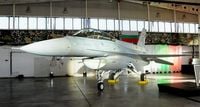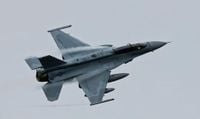On Sunday, Bulgaria celebrated a significant milestone in its defense capabilities with the arrival of its first F-16 Block 70 fighter jet, marking a new chapter in the nation's air defense strategy. The ceremony, which took place at Graf Ignatievo Air Base, was attended by high-ranking officials, including Prime Minister Rosen Zhelyazkov and Defense Minister Atanas Zapryanov, symbolizing Bulgaria's commitment to enhancing its military readiness and strengthening its role within NATO.
The F-16 Block 70, tail number 311, had departed from the Lockheed Martin assembly plant in Greenville, South Carolina, on March 31, and arrived in Bulgaria on April 2. This advanced fighter jet is expected to significantly improve the Bulgarian Air Force's ability to counter regional threats and operate more effectively alongside NATO allies.
During the welcoming ceremony, Prime Minister Zhelyazkov emphasized the importance of the delivery, stating, "Over the past few years, the problems with combat aviation have been known publicly. Now we have a new platform using the latest technology, and this provides a fundamental change in our capabilities." He further noted that the arrival of the F-16 is not merely about acquiring a new aircraft but also represents a concrete symbol of Bulgaria's strategic partnership with the United States.
The F-16 Block 70 is equipped with state-of-the-art technology, including the Northrop Grumman APG-83 AESA radar, advanced avionics, and an impressive structural service life of 12,000 hours. Among its critical safety features is the Automatic Ground Collision Avoidance System (Auto GCAS), which has already saved 13 pilots in 12 separate incidents since its introduction in 2014. This highlights the aircraft's exceptional safety record and its advanced capabilities compared to older models.
Bulgaria has ordered a total of 16 F-16 Block 70 aircraft, with the first batch of eight scheduled for delivery by the end of 2025. The acquisition of these jets is part of a broader effort to modernize the Bulgarian military, which has faced challenges with its aging fleet, particularly the MiG-29 fighter jets. The new F-16s are expected to replace these older aircraft, providing enhanced operational capabilities and interoperability with NATO forces.
Lockheed Martin's Vice President and General Manager of the Integrated Fighter Group, Mike Shoemaker, spoke at the event, highlighting the broader significance of the delivery. He remarked, "This is not just a celebration of a new aircraft for the Bulgarian Air Force – it represents a new era of enhanced security, advanced capabilities and strengthened partnerships in the region." This sentiment underscores the importance of international cooperation in defense and security.
Following the arrival of the F-16, ground crews promptly replaced the U.S. Air Force insignia on the aircraft with that of the Bulgarian Air Force, initiating the aircraft acceptance process. According to the Bulgarian Ministry of Defense, the F-16 will officially join the Bulgarian Air Force at a ceremony scheduled for April 12, after completing the necessary technical and flight acceptance evaluations.
In addition to the first contract, which was signed in 2019 and worth $512 million, a second contract was signed in 2022 for $1.3 billion, covering an additional eight aircraft. Deliveries under this second contract are expected to commence in 2026 or 2027, contingent on the procurement schedule remaining intact. Lockheed Martin is currently managing a production backlog of 114 F-16 Block 70/72 jets at its South Carolina facility, with 26 already delivered to international partners.
The F-16 Block 70/72 configuration jets, also known as the "Viper," incorporate higher standards in hardware and structure than previous F-16 models. The advanced systems installed on these aircraft include a Link 16 data link, an Embedded GPS/INS, and a 6 x 8 Center Pedestal Display (CPD). These enhancements allow for more efficient use of the AESA radar and improved processing of targeting pod data, enabling the deployment of next-generation weapons.
With the delivery of the F-16 Block 70, Bulgaria joins a European fleet of over 700 F-16s and a global network exceeding 3,100 aircraft. Apart from Bulgaria, only three other countries—Greece, Bahrain, and Slovakia—currently operate this latest-generation variant. Countries such as Taiwan, Jordan, and Morocco are also awaiting delivery of these advanced fighter jets, while Türkiye, the Philippines, and Thailand plan to procure F-16V fighter jets in the near future.
The arrival of Bulgaria's first F-16 Block 70 fighter jet not only marks a significant enhancement in the nation's air defense capabilities but also reinforces its strategic partnerships with the United States and NATO. As Bulgaria continues to modernize its military, the integration of these advanced aircraft will play a crucial role in ensuring the country's security and its contributions to regional stability.





